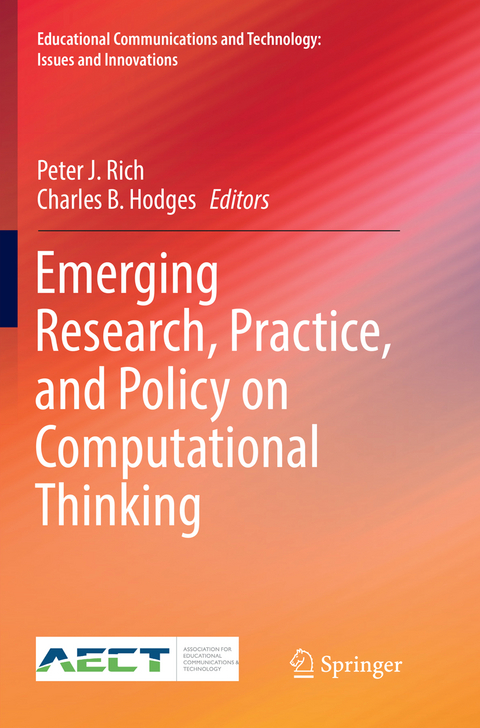
Emerging Research, Practice, and Policy on Computational Thinking
Springer International Publishing (Verlag)
978-3-319-84964-5 (ISBN)
Dr. Peter Rich is an Associate Professor of Instructional Psychology and Technology at Brigham Young University in Provo, Utah, USA. Dr. Rich earned a B.S. in Spanish with a minor in TESOL, after which he went on to earn a PhD in Instructional Technology from the University of Georgia at Athens. Dr. Rich researches convergent cognition, the synergistic effect that occurs when learners study complementary subjects, such as first and second language and mathematics and computer programming. His current efforts focus on teaching younger students to learn computing and engineering and to apply these thinking processes to complementary subjects. He has taught students from 1st to 8th grade how to code computers and robots. Over the past 12 years, Dr. Rich has worked with teachers in professional development to refine and reform their teaching practices. Dr. Rich has published over 2 dozen articles and book chapters, and an edited book on digital video analysis in teacher education. Dr. Charles B. Hodges is an Associate Professor of Instructional Technology at Georgia Southern University and is currently the Editor-in-Chief of the journal, TechTrends: Linking Research and Practice to Improve Learning. Dr. Hodges earned a B.S. degree in Mathematics with a minor in Computer Science from Fairmont State University, a M.S. degree in Mathematics from West Virginia University, and a Ph.D. from the Learning Sciences and Technologies program at Virginia Tech. Prior to joining the faculty at Georgia Southern University he was a member of the mathematics faculty at Virginia Tech for 15 years. His research has focused mainly on self-efficacy in technology intensive mathematics courses and the professional development of STEM teachers. He has published over 30 scholarly works and delivered numerous conference presentations. He has worked on multiple federally-funded grants and contracts as principal investigator or co-principal investigator. Most recently he was funded by the National Youth at Risk Center of Georgia Southern University to study Computer Science education rural schools.
Part1. K-12 Education.- Chapter1. Learning computational skills in ucode@uwg:challenges and recommendations.- Chapter2. Making computer science attractive to high school girls with computational thinking approaches:a case study. - Chapter3. Understanding african-american students' problem-solving ability in the pre-calculus and advanced placement computer science classroom.- Chapter4. Computational thinking as an interdisciplinary approach to computer science school curricula:computer scientific reasoning in the medical curriculum.- Chapter5. Proto-computational Thinking: the Uncomfortable Underpinnings.- Part2. Higher Education.- Chapter6. Medical computational thinking: computer scientific reasoning in the medical curriculum.- Chapter7. Integrating computational thinking in discrete structures.- Chapter8. A computational approach to learning programming using visual programming in a developing country university.- Chapter9. Creating and evaluating a visual programming course basedon student experience.- Chapter10. Using model-based learning to promote computational thinking education.- Part3. Teacher Development.- Chapter11. Teaching computational thinking patterns in rural communities.- Chapter12. Teacher transformations in developing computational thinking gaming and robotics use in after-school settings.- Chapter13. Computational thinking in teacher education.- Chapter14. Computational thinking conceptions and misconceptions:progression of preservice teacher thinking during computer science lesson planning.- Chapter15. The code abc mooc experiences from a coding and computational thinking mooc for finnish primary school teachers.- Chapter16. Assessing computational thinking across the curriculum.- Chapter17. Assessing algorithmic & computational thinking in k-12 lessons from a middle school classroom.- Chapter18. Principles of computational thinking tools.- Chapter19. Exploring strengths and weaknesses in middle school students' computational thinking in scratch.- Chapter20. Measuring computational thinking development with the fun! Tool.- Chapter21. Reenergizing cs0 in china.- Chapter22. Computational thinking:efforts in korea.- Chapter23. A future-focused education:designed to create the innovators of tomorrow.- Chapter24. Computational participation teaching kids to create and connect through code.
| Erscheinungsdatum | 10.04.2019 |
|---|---|
| Reihe/Serie | Educational Communications and Technology: Issues and Innovations |
| Zusatzinfo | XXVII, 413 p. 60 illus., 41 illus. in color. |
| Verlagsort | Cham |
| Sprache | englisch |
| Maße | 155 x 235 mm |
| Gewicht | 6672 g |
| Themenwelt | Schulbuch / Wörterbuch ► Unterrichtsvorbereitung ► Unterrichts-Handreichungen |
| Geisteswissenschaften ► Psychologie ► Allgemeine Psychologie | |
| Geisteswissenschaften ► Psychologie ► Pädagogische Psychologie | |
| Sozialwissenschaften ► Pädagogik ► Schulpädagogik / Grundschule | |
| Schlagworte | Coding and education • computational thinking • Computational thinking and education • Computational thinking in the humanities • Learning and Instruction • STEM Education • STEM education in formal schooling • STEM education in informal schooling |
| ISBN-10 | 3-319-84964-6 / 3319849646 |
| ISBN-13 | 978-3-319-84964-5 / 9783319849645 |
| Zustand | Neuware |
| Haben Sie eine Frage zum Produkt? |
aus dem Bereich


